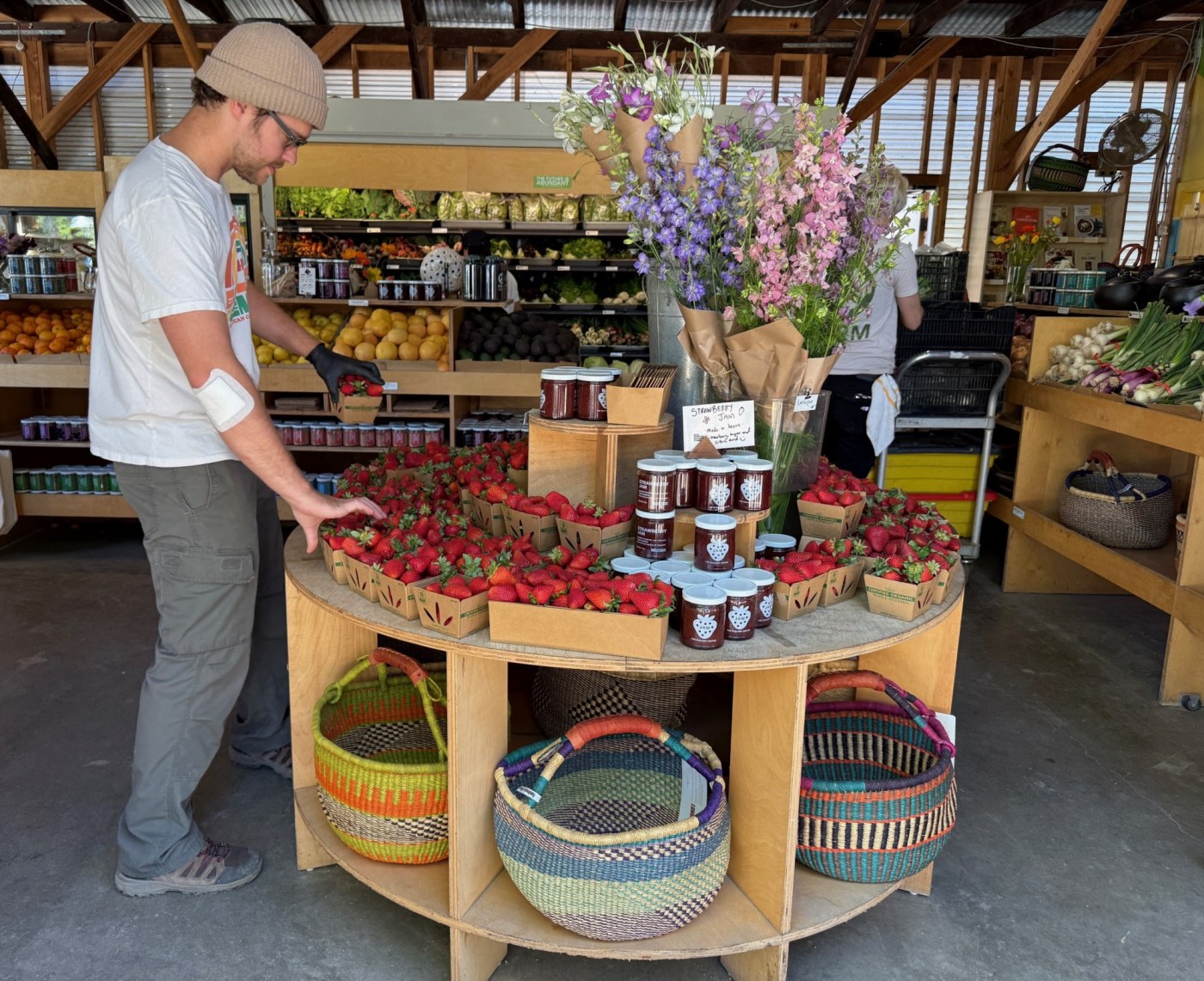Strawberries fresh from the fields vie for space with bread fresh from the oven as customers with colorful shopping baskets pick and choose.
It has the look of many farmers markets, but the Farm Store in San Juan Capistrano is a permanent fixture of the Ecology Center, open every day year-round. All the produce sold there comes from the fields just yards away on the longest continuously running farm in Orange County.
“For thousands of years, the Acjachemen tribal members farmed this land, and we feel that we are just stewards caring for it,” said Jonathan Zaidman, the center’s vice president of community.
Executive Director Evan Marks, who had created ecological projects in Central America and Africa, brought his passion for the land to this area when he founded the Ecology Center in 2008.
Six years later, Zaidman joined him to create “our version of a community relationship with the land,” he said.
The pair sought to build and harness a population of people passionate about health and nourishment and zealous about respecting and caring for the land.
“What does that (passion and commitment) look and taste like?” Zaidman asked. “We try to show people what that is like.”
The ecological oasis is filled with trees, drought-tolerant plants, fruits, vegetables and flowers. Since 2019, it has encompassed a 28-acre regenerative organic-certified farm. The land is owned by the city of San Juan Capistrano and leased to the center.
Located on the premises, besides the country store, are a café, a permanent school plus a play area for visiting children, a special events dome, a picnic and eating area, and the working fields beyond. The farm became part of the center when a commercial organic grower whose land surrounded the original center went belly-up and it was offered to the center for lease by the city.
Also on the grounds sits the 1878 Congdon House, the oldest wooden structure in the city.
The city does not provide funds for the nonprofit center, which relies on donations, admission to special events, and proceeds from the sale of produce and branded merchandise sold in the store,
“Everything we grow is sold in the Farm Store, used in the café or reinvested in the center,” Zaidman said.
Many local chefs and restaurants source ingredients from the farm, which has grown foodstuffs requested by area chefs for special preparations.
“The farm is the beating heart of our operation,” he said.
On any given day, the center is bustling with shoppers, visiting families, hungry guests, and workers running to and fro servicing the various activities. The café is open for breakfast and lunch from 9 a.m. to 3 p.m. Monday to Friday, with a farm brunch offered Saturdays and Sundays. Wednesday dinners from 5 to 9 p.m. feature pizza, while on Thursday and Friday nights, farm dinners are served. Outdoor tables offer an inviting place to chow down.
Newly opened on the grounds is Zaidman’s favorite locale, the Peace Dome, designed to house special events, lectures, and happenings like movies and concerts.
From inside the meditative space, you can gaze through clear wall panels toward the colorful fields of flowers and food.
“The surroundings are vibrant, dynamic and beautiful,” Zaidman said with a large dose of pride.
On the Wednesday I visited, I asked Zaidman if the bustling crowd represented a particularly busy day. His answer was that it was “a slow day.” Weekends see the most visitors, he added.
The center boasts a staff of 125, many of whom work there full-time. It prides itself on offering employees a living wage, including the field workers.
“We develop a relationship between the food and the grower,” Zaidman said.
More than 100 plantings, such as strawberries, lettuce, tomatoes, eggplant and fava beans, are grown. Crops are rotated seasonally, with fields allowed to regenerate in turn. Tree plantings encompass Mediterranean, stone fruits, apples and pears, and citrus in appropriate quadrants of the land.
Much of the center’s core beliefs were inspired by the farm-to-table movement spearheaded by Berkeley chef Alice Waters in the 1970s. The center operates with care for the food and reverence for the land, Zaidman said.
“Our goal was to bring the space to life and offer a model of community,” he said.
Programming includes specialty dinners, educational offerings, school field trips and field demonstrations.
Among the premiere offerings at the center are its Community Table dinners set outdoors on Saturday nights through November. Area chefs with particular strengths cook their specially themed dinners using ingredients from the farm or foraged within a distance of 25 miles.
“The chef will bring 75 people together to tell his or her story and celebrate the local culture,” Zaidman said.
Featured chefs are listed on the center’s website.
“Our values are driven by the ingredients, and we believe in wrapping our arms around our value system,” he said. “Our hope and goal is to bring back the agricultural atmosphere that the O.C. once had and to bring healing to the community and the culture.”
The Ecology Center is located at 32701 Alipaz St. in San Juan Capistrano. It is open from 9 a.m. to 6 p.m. daily. For information, call 949-443-4223 or visit theecologycenter.org.






